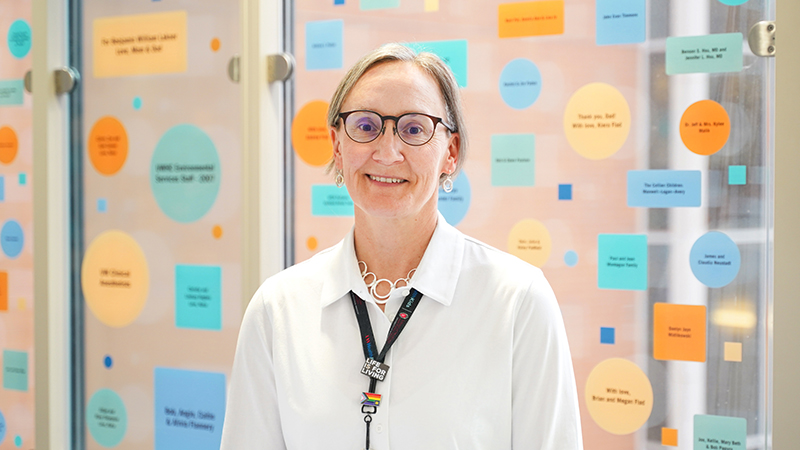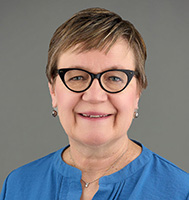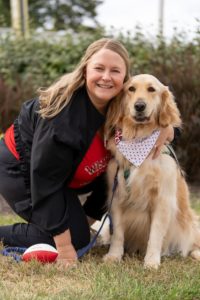
With an undergraduate degree in cell and molecular biology, Anne Marsh, MD, now associate professor in the Division of Hematology, Oncology, Transplant, and Cellular Therapy, was determined to become a physician. After a short excursus of practical application in a Mayo Clinic molecular microbiology lab, Marsh entered the UW School of Medicine and Public Health (SMPH) and completed her medical degree in 2007. Her intern experiences in pediatric residency at SMPH sparked a strong interest in hematology and oncology.
“I enjoyed the fact that in order to be a good pediatric blood and cancer specialist, you need to be a good generalist and understand all the different organ systems,” Marsh said.
Her subsequent fellowship in pediatric hematology and oncology at Children’s Hospital and Research Center in Oakland, California, influenced her in ways she could not have predicted. Marsh began to focus in a particular area of hematology: sickle cell disease. She trained in Oakland at the largest sickle cell center west of the Mississippi River, which cared for around 300 children with sickle cell disease. It captured her mind and heart and became for her, as she described it, “the perfect marriage between medicine and social justice.”
Sickle cell disease is a congenital form of anemia in which normally smooth, flexible, and O-shaped red blood cells become instead rigid, sticky, and shaped like the letter “C.” They cluster together and stick in small blood vessels, which blocks blood flow and oxygen delivery. Its cause was discovered in 1910, and it affects primarily Black people of African descent. It results in anemia, intense pain, increased risk of infection, and a host of other very serious complications. Historically, few disease-modifying therapies have existed for the treatment of sickle cell disease. In late 2023, however, a new era of hope was ushered in with FDA approval of the first cell-based gene therapies.
From 2013 to 2020, Marsh served as associate hematologist/oncologist at Oakland’s UCSF Benioff Children’s Hospital, and also directed its sickle cell clinic from 2015 to 2020.
She came to UW SMPH Department of Pediatrics in 2020, joining the Division of Hematology, Oncology, Transplant, and Cellular Therapy. Since then, she has served as director of the UW Health Kids Pediatric Sickle Cell Program. Although the number of people with sickle cell disease in Wisconsin is small (about 1,175 total cases in Wisconsin), nearly 8 million people live with its effects across the world, underscoring the need for more research efforts to help improve global health. She offered an extensive Pediatric Grand Rounds presentation on the disease in January of this year.
Marsh has also served since October 2023 in the Wisconsin Department of Health Services Newborn Screening (NBS) Program, chairing the Hemoglobinopathy Subcommittee. She consults with Wisconsin physicians who have received positive NBS results for their patients.
Beyond her work in sickle cell disease, Marsh’s years of experience in pediatric oncology shepherded her into her current practice and position as director of the UW Health Kids Pediatric Palliative Care Program.
“One of the things I love most about caring for children with blood disorders and cancers is that you develop the gift of a longitudinal relationship with them,” Marsh explained. “You get to care for them not only when they are sick and in the hospital, but you also get to see them in clinic. You get to celebrate their highs, and be with them through the lows, which makes this work deeply meaningful.”
But Marsh was also deeply affected by the amount of suffering that she — and all those in practice in pediatric oncology — bear witness to. “There are times when our focus needs to shift away from the possibility of cure, toward the prioritization of comfort. These are tender and sacred conversations, and ones that for some reason, I find myself drawn to,” Marsh said. She often found it difficult to continue to suggest to families the next and the next and the next possible treatment-focused interventions, when with each subsequent option, the chance for a cure became successively narrower.
“It is very important to me that patients and families are offered all possible treatment pathways, presented in a balanced way, that gives families the time, space, and permission to choose whatever feels right for them,” Marsh said. For some, this may be a treatment-focused pathway. For others, this may be more comfort-focused care. She explained, “We hold space for families to reflect on all options, and importantly, help them understand that choosing a comfort-focused pathway can be as equally loving and equally compassionate as choosing potentially life-prolonging therapies.”
The option to shift to comfort-focused care has to be made manifest as a possible pathway: clear, humane, an act of profound love. She explained that when families were allowed a space in which they felt comfortable reflecting on that most difficult of decisions, “It’s an honor to be in vulnerable and sacred spaces with families to help them navigate what end-of-life care can look like for their child.”
And so, Marsh became very interested in helping families navigate end-of-life care. “I think one of the most privileged and important things that we can do as physicians is to provide guidance, counsel, and support at the end of a child’s life,” she said. Marsh finds tremendous meaning and purpose in that work at the Pediatric Palliative Care Medicine Clinic, where she engages in those efforts with her interdisciplinary team at the American Family Children’s Hospital (AFCH).

During her residency, Marsh came to know Margo Hoover-Regan, MD, professor, Division of Hematology, Oncology, Transplant, and Cellular Therapy, as an attending physician. Hoover-Regan led the efforts to start multidisciplinary pediatric palliative care at AFCH nearly 20 years ago. From small and humble beginnings, the pediatric palliative care team has evolved into a large, dedicated program that follows one in every three or four children admitted at AFCH on any given day. In the last few years, its consult services have become the most requested inpatient counsel in the hospital.

The team includes Marsh and Hoover-Regan, as well as four NPs, a RN, a social worker, a child life specialist, and a chaplain. Since 2022, a special facility dog, Cola, a golden doodle trained to help young patients cope with stress, has been part of the team. His handler, Katie Markowski, is a UW Health Kids child life specialist. Markowski and Cola recently celebrated their 1,000th joint patient encounter on the palliative care team.
Marsh noted that early on the vast majority of kids in the palliative care program were patients with cancer. That has changed. “The subspeciality has grown remarkably to care for children with all different types of life-altering or life-limiting conditions, including, for example, children with genetic differences, those born prematurely, those with medical complexity, those with traumatic injuries, children born with congenital differences, and those awaiting organ transplantation,” Marsh explained. “The breadth of what we now engage in is very wide.”
Marsh noted that the work is emotionally difficult, and she is often asked, How do you do this? “What makes it sustainable is the joy and privilege of working alongside the dedicated people on the team,” Marsh said. “The folks in this group are people who I walk through fire with every day. We laugh together, cry together, celebrate together, and extend a lot of grace to one another, day to day.”
Palliative care is all about minimizing suffering and maximizing quality of life. “Whatever time a child has, we help them live their best quality of life within it,” Marsh explained. “Sometimes that time might be four years — sometimes it might be four minutes, depending on what’s happening. The essence of this work is trying to capitalize on the gift of time: time is the one thing we can never get back.”
Marsh gave a presentation on the work of the Pediatric Palliative Care Program during the 2024 Clinical Care Week entitled, “Navigating Tender Conversations: A Call to Connection.”
Lead photo by Kate Feldt/Department of Pediatrics